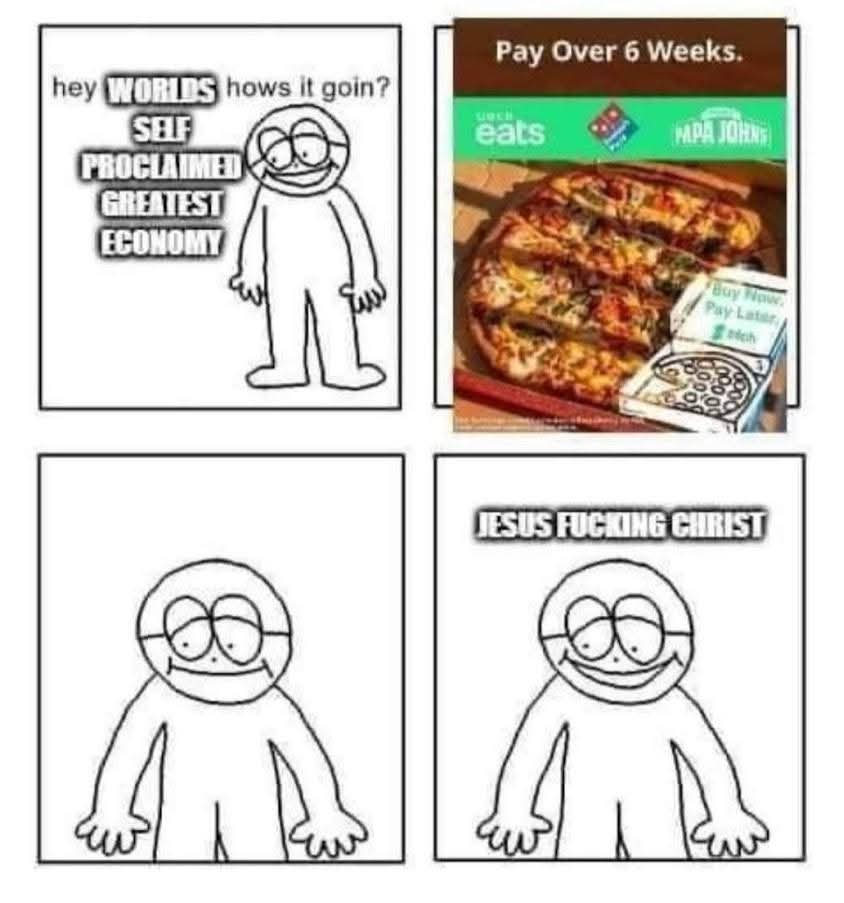Layaway
-
[email protected]replied to [email protected] last edited by
Based on my sample size of the one Dominoes restaurant in Nijmegen (Netherlands): it is better outside of the US. Still not great, but better. The chicken shoarma pizza could possibly be considered 'good' if it were fresh, but that location only does delivery so...
-
[email protected]replied to [email protected] last edited by
Even knowing this and the grand plan, I feel like I get sucked in, too. It starts as "wanting to stick it to the man" by taking them up on whatever overly generous deal they feel like offering. "I know they'll get rid of it eventually, but there's no harm in abusing it while I can". But any "good" company won't just instantly quadruple their prices and sack all of their customer service staff on the spot. It'll always start off slowly. They'll offer promotions that are 5% less generous, they'll start to charge bag fees or service charges. They'll impose minimum transaction amounts. Etc.
By the time it becomes obvious, it usually too ingrained in your life, and the lives of many others to easily ditch. I saw this happen a lot with uber eats and Doordash. During COVID, they were paying people to stand at train stations and hand out flyers. They'd be offering like 50, 60, 70,.sometimes 80% off your order. Some of them were one time use only, but the lower value ones like 40% were usually reusable if you got a new code. Eventually by this point where you have to sign up for a monthly subscription to get any discount, it's already kinda ingrained in my life and once or twice a week when I "can't be arsed cooking" I end up just ordering something in and blowing 20 or 30 bucks on a meal rather than just keeping a pizza or some salad or other easy meals in the freezer
I could rant for a long time about the uberification of food delivery. Even places offering "in house" food delivery usually end up using on demand uber eats drivers anyway. Then they'll have the audacity to mark everything up 30%, charge a card surcharge, service fee, bag fees, priority delivery fee, on top of a delivery fee. Places that manage their own deliveries with hourly employees, not "iNdEpEnDeNt CoNtRaCtOrS" goes in my good books
-
[email protected]replied to UnfortunateShort last edited by
It’s the same in Japan! Smallest pizza you can imagine at 3-5x the price
-
[email protected]replied to [email protected] last edited by
I can't not hear "the greatest technician that's ever lived" after seeing this
-
[email protected]replied to [email protected] last edited by
Lol, a normal sized three topping pizza here in Germany at Papa Johns is like 17$. Domino's is not better with ~15-16$ though.
-
[email protected]replied to [email protected] last edited by
Why is the pizza in prison
-
[email protected]replied to UnfortunateShort last edited by
I remember having one in Norway, where the location was at a waterfront. Their dough tasted like it was bathed in saltwater 🤮
-
[email protected]replied to [email protected] last edited by
Nah, I live in an area with lots of older Italian immigrant families actually, there's a few pizza shops, sandwich shops, and import markets that have way better pizza.
Domino's is when I'm being a lazy fat piece of shit and grabbing cheapo garbage on my way home from work or something. Rittino's has way better food, but their large pizza costs $25
-
[email protected]replied to [email protected] last edited by

MFW, Chicago pizza prices are higher than Germany and people are saying Europe has the most expensive pizzas, while other Americans are paying less than $10 for a pie.
-
[email protected]replied to [email protected] last edited by
This is how they make money. It's the only way they make money.
That is not correct. Klarna is functionally a payment processor, like an advanced type of credit card, and charges the merchant fees per transaction. For example, see here. They are highly cagey about specific fees until you actually sign up, and it depends on region and business size. But interchange fees are where the majority of their revenue comes from. To my knowledge, the fees are typically 3 percentage points above what the merchant would pay for a credit card transaction.
The reason merchants still accept Klarna despite the high fees is of course, improved conversion rates and decreased risk. Klarna assumes all the risk of the customer not paying, the shop gets all of the money instantly and doesn't have to worry about it for the most part. That mainly makes it attractive for high margin shops that don't mind spending lots on marketing to get a few extra sales (fashion, perfume, high end electronics).
I'm not too knowledgeable on how Klarna deals with late fees, but I'm pretty sure it differs per country they operate in. Many places have regulations limiting the abuse of late fees. I wouldn't be surprised if the US is not that kind of place, and people who are late get fucked with fees.
In general, I agree with the second part of your comment and I do not recommend using any buy-now-pay-later kind of scheme, because you're taking on additional risk for no real reason. Lots of stuff can happen even through no fault of your own (check engine light? Job downsizing?) that will affect your expected future income.
-
[email protected]replied to [email protected] last edited by
Here's the thing, though. There's no interest charged to the customer. I think Klarna makes its money just because companies pay them money for integrations and for the ability to advertise that customers can buy now pay later and such. And at least in the case of my company's integration with Klarna, Klarna takes all the risk. They're lending customers money and hoping the customers pay it back. My employer gets the money up front and isn't out any money if the customer doesn't pay.
Your company pays a transaction fee just like with a credit card. Except it's usually roughly twice as expensive as a credit card. This is what allows Klarna to take on all that risk, generally. For your company this is essentially a marketing expense. Offer a convenient way to pay in return for a few percent of the transaction (3-6% + a fixed fee, $0.30 perhaps).
Klarna generally partners with some financial firm to finance these short term loans, and they use the merchant fee to pay interest. These can be as high as 25% APR. It's a high risk loan.
-
[email protected]replied to [email protected] last edited by
Papa John is technically a pizza crime.
-
[email protected]replied to [email protected] last edited by
Yeah, you're right,
I forgot that when I read about it, it was also mentioned they got payment processor fees.
As for the way they handle late fees, the article I read was about the US (somebody posted an article about it here in Lemmy not that long ago) and indeed some other countries limit that sort of thing.
-
[email protected]replied to [email protected] last edited by
Luckily, it seems government are finally getting their acts together to regulate these schemes:
https://www.choice.com.au/money/credit-cards-and-loans/personal-loans/articles/bnpl-legislation-passes-parliamentWhich means they need to register as credit providers, which is what they are...
-
[email protected]replied to [email protected] last edited by
Reminds me of something I heard back in 'zine times. "The trick is not to ignore the mainstream, but to selectively raid it for things we can use." -Mike Gunderloy. The resources are there, so go ahead and use them -- just do it on your own terms, consciously. I don't have Amazon Prime, but when my elderly relative needed a safety device and I could only find it on Amazon, you bet I got it from there.
-
[email protected]replied to [email protected] last edited by
I don’t think most people in the US would know what chicken shwarma is. The concept sounds good but I’m sure dominoes would find a way to fuck it up.

